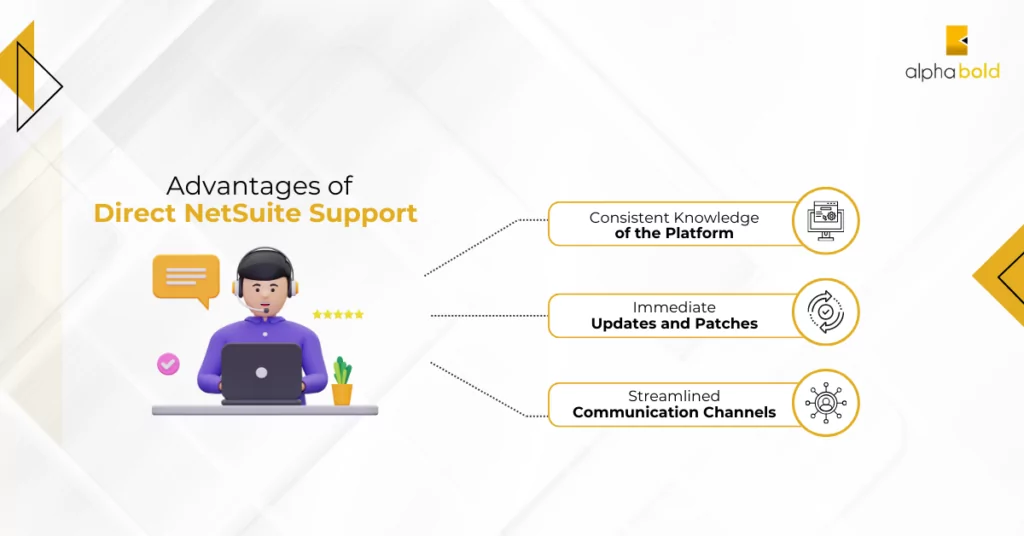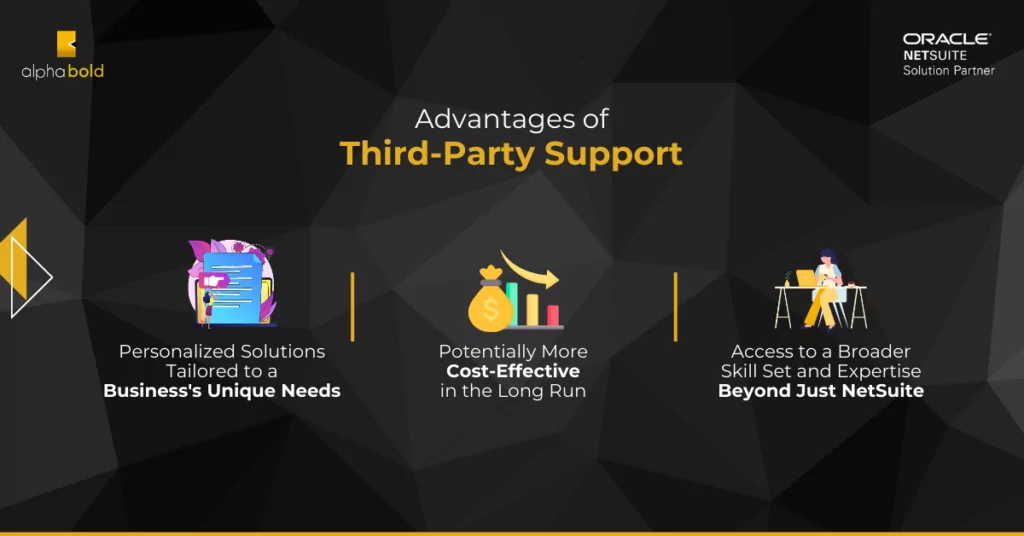A Deep Dive into NetSuite Support-Evaluating Direct vs. Third-Party Offerings

Home » Blog » Product Updates & Support » A Deep Dive into NetSuite Support-Evaluating Direct vs. Third-Party Offerings


Enterprise Resource Planning (ERP) systems are the foundation of modern business operations. They integrate and manage the critical aspects of a business—from finance, human resources, and supply chain to customer relations, e-commerce, and more. Given the intertwined and crucial nature of these operations, it is evident that any interruptions or inefficiencies in the ERP system can reverberate throughout the organization. This is where the significance of reliable ERP support, like the NetSuite Partner Support and offerings provided by AlphaBOLD, comes into play. This blog covers the significance and impact of impeccable NetSuite Partner Support and how AlphaBOLD is helping countless businesses with scalability.
Reliable ERP support acts as a safety net, promptly addressing any system glitches, bugs, or interruptions. Immediate response and resolution minimize downtime, ensuring that the business operations flow seamlessly and that internal and external stakeholders are minimally affected.
As businesses evolve, their needs change. They might diversify into new markets, introduce new product lines, or expand globally. In such scenarios, the ERP system must be adaptable, scalable, and capable of integrating new functionalities. Reliable support plays a pivotal role in ensuring this.
With consistent partner support, businesses can implement new modules, adapt to changing regulatory environments, or integrate with other technological solutions while ensuring the ERP system remains stable. This adaptability is the cornerstone of sustainable growth.
The strategic importance of reliable ERP support cannot be overstated. As the digital nerve center of an organization, the ERP system needs consistent, expert support to ensure that the business remains resilient, efficient, and poised for growth. In a world where agility and adaptability are paramount, robust ERP support isn’t just an operational need but a strategic imperative.
Unlock the full potential of NetSuite with AlphaBOLD's expert support solutions. Get started with us for superior results!
Request a ConsultationWhen it comes to getting the most out of any ERP solution, the quality of the support offered plays a crucial role. This brings us to the NetSuite partner support offering cloud ERP solutions, offers its own direct support system. But what does that mean for your business, and how does it measure up? Let’s delve deeper.
Direct NetSuite Support refers to the official assistance and resources provided by Oracle NetSuite for its customers. This includes a range of services like technical troubleshooting, software updates, knowledge resources, and consultations. Essentially, when you reach out for support directly from the software manufacturer, you are tapping into this service.
The NetSuite support offering is an integral element of the NetSuite ecosystem. Its direct support service is closely interwoven with the platform, guaranteeing that support representatives possess thorough and current knowledge about the software. These experts utilize specialized tools that are intricately connected to the platform, facilitating an efficient and effective diagnostic and resolution process.

There are a number of advantages when working with NetSuite’s direct support options:
One of the prime benefits of NetSuite’s direct support is the consistency in knowledge. Support representatives are trained explicitly on the NetSuite platform and are familiar with its every nuance, ensuring that they can address issues with a higher degree of expertise. Its direct support service is closely interwoven with the platform, guaranteeing that support representatives possess thorough and current knowledge about the software.
Being directly under the NetSuite umbrella means that any updates, patches, or new features released by the software will be immediately available to you. There’s no middleman or delay, ensuring that you always have the latest and most secure version of the software running. Furthermore, NetSuite employees have visibility into back-end messages that third-parties may not have access to directly on their screen. Some issues may be difficult to address without the back-end access NetSuite offers its direct employees.
With direct support, communication is straightforward. Whether it’s through dedicated helplines, chat support, or official documentation, the channels are streamlined, ensuring that you receive accurate and prompt responses. Furthermore, as a large organization, NetSuite pays close attention to its SLAs and dedicates many resources to their support department.
Direct support with NetSuite can also come with the following potential limitations:
While direct support offers numerous benefits, it might come at a premium. Depending on the scale and specific needs of your business, you may find that the cost of direct support from NetSuite is higher compared to third-party providers. Additionally, once the contract is signed, there is little wiggle room to get out of- NetSuite will not let you terminate a contract at any time like a third-party provider will.
While the knowledge of direct support teams is consistent, it may sometimes lean towards generic solutions. For businesses with very tailored or niche requirements, this could mean that the support provided doesn’t always align perfectly with their unique operational needs. Without access and deep knowledge of the customer’s industry, environment, unique configurations, and customizations, it becomes difficult to offer quality support.
NetSuite has a large database of open tickets that they quickly query and offer solutions against. However, when the system breaks, employees don’t have the necessary training to understand the customer’s environment, nor can they come up with process recommendations on the fly. The lack of personalized familiarity with an environment limits the quality of support NetSuite can offer.
Popular platforms like NetSuite cater to a vast number of clients globally. This can sometimes lead to longer wait times, especially during peak hours or widespread issues, delaying the resolution process.
Explore our specialized NetSuite support offerings for seamless operations and enhanced efficiency. Inquire today!
Request a ConsultationTransitioning from direct support, let’s explore the realm of third-party NetSuite support. This alternative avenue offers a different set of benefits and challenges which businesses should be aware of when making an informed decision.
Third-party NetSuite Support partners are independent organizations that provide support, consultancy, and customization services for NetSuite’s ERP platform. There are two types of NetSuite partners- Solution Providers and Alliance Partners. Solution Providers, are often certified and recognized for their expertise in implementing and supporting the NetSuite platform. These partners may also get access to specialized resources, tools, and early updates, ensuring they remain abreast of the platform’s evolution. This ensures that they maintain a proficiency level that meets NetSuite’s standards. Solution Providers are also licensed to sell NetSuite software and user licenses, while Alliance Partners are not.

Perhaps the most significant advantage of third-party support is the level of personalization they can offer. Given that they operate independently, they often have the flexibility to devise solutions tailored to a business’s unique requirements and nuances, which might not always be feasible with direct support. Furthermore, partners often possess specialized expertise that NetSuite Direct Support may reserve for their Tier 1 Customers only.
Third-party partners often operate in competitive markets, which can drive them to offer competitive pricing. Additionally, given their focus on tailored solutions, businesses might find that they receive value-added services, leading to cost savings in the long term.
Many third-party partners don’t limit their expertise to just NetSuite. They might offer proficiency in integrating NetSuite with other platforms, tools, or technologies. This broader skill set can be invaluable for businesses looking to create a cohesive technological ecosystem. Partners also offer greater flexibility and greater attention to detail. This is ideal for smaller companies seeking a ‘one-stop-shop’ partner for all of their IT needs.
Partners have contract negotiation, system improvements, and defect remediation since they don’t directly work for NetSuite Oracle.
Not all third-party providers are created equal. The quality of service, expertise, and responsiveness can vary significantly between providers. It’s crucial for businesses to conduct thorough due diligence before selecting a partner.
In the grand scheme of things, third-party NetSuite support partners offer a valuable alternative to direct support, especially for businesses that value customization and a broader technological perspective. However, it’s essential to weigh these advantages against the potential limitations and choose a partner that aligns with your business’s long-term vision and goals. Because third-party partners are often smaller businesses, their core competitive advantage lies in their loyalty- customer trust is only earned through providing quality service, which helps them retain customers and grow as a business. In the upcoming sections, we’ll delve deeper into making an informed decision based on various business contexts.

Streamline your ERP selection process with our comprehensive checklist, ensuring you make informed decisions for your business's future success.
Learn more
As we’ve explored the various NetSuite support offerings, it becomes evident that there isn’t a one-size-fits-all solution. Depending on several factors, businesses might find one model more appealing. Here, we’ll discuss the crucial considerations you should factor into your decision-making process when choosing between direct and third-party NetSuite support.
While it might be tempting to lean towards the most cost-effective option, it’s essential to look at the value offered. Direct support, while potentially pricier, offers a streamlined experience with the assurance of dealing directly with the software provider. On the other hand, third-party providers, while often more affordable, can provide added value through personalized solutions.
Each business is distinct, with its own unique set of requirements. This necessitates a careful evaluation of various factors when selecting the ideal NetSuite support offering. Such a tailored approach ensures that the chosen support aligns perfectly with the business’s specific needs.
If your business relies heavily on custom modules tailored to specific needs, third-party support might be more suitable, given their expertise in customization.
Businesses utilizing a plethora of tools and technologies alongside NetSuite may benefit from third-party support providers with a broad technological expertise, ensuring seamless integrations and interoperability. Partners have dedicated IT professionals whose main expertise is to build and support integrations across different solution architecture models.
If your business has niche requirements, like industry-specific functionalities, it might be worthwhile to consider third-party partners with experience in that domain.
Your choice of support should not just cater to your present needs but also accommodate future growth. If you anticipate significant expansion or diversification, you’ll want a support model that’s flexible and scalable.
While direct support ensures you’re always in line with the latest offerings from NetSuite, third-party support might offer the agility and customization capabilities to adjust your ERP system in tandem with your growth strategies.
In conclusion, when choosing a support model for NetSuite, businesses need to introspect on their current stature, budget, unique requirements, and future ambitions. Both direct and third-party supports have their merits, and the right choice often boils down to the specific context of the business in question.
Trust AlphaBOLD for top-notch NetSuite support offerings that streamline your operations. Reach out to us for a consultation!
Request a ConsultationChoosing the right NetSuite support partner and offering is a decision that reverberates through the very operations of your business. As we’ve journeyed through the intricacies of both direct and third-party offerings, the paramount importance of making an informed, well-considered decision cannot be overstated. Every business has its unique needs, challenges, and ambitions. It’s crucial to weigh the benefits of each support model against your specific circumstances, remembering that the optimal choice today can ensure smoother operations, adaptability, and growth for tomorrow. If ever in doubt, remember that consulting experts in the field can provide invaluable insights tailored to your business’s distinct scope.



